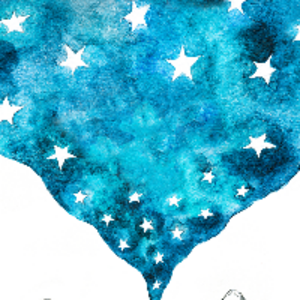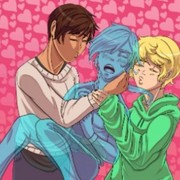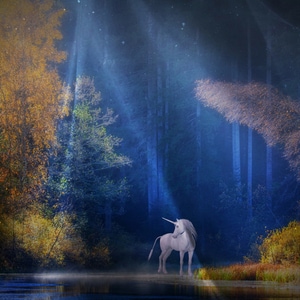Four days ago
“What do you hear?” John asked.
In the purple light of evening, the forest glowed with colour. It had rained earlier, rinsing away the dust of summer, and now the rich muted tones of each blade of grass, each leaf, each dog-rose and each grey flake of bark strove together in a dim and dazzling tapestry.
The tailor’s daughter stood above him on the rocks, but she was not looking up at the moody sky, nor down the valley where the wind-shaken trees rippled like sea-water. She had snatched off her white coif and cocked her head birdwise, and through a curtain of fair hair shining palely in the half-light John thought he saw her smiling.
“I hear music,” Janet told him. “Pipes and drums.”
At that John stirred uneasily, glancing up at the sky. “Come down, love, and let’s home.”
But she stepped forward, closer to the rocky edge, a lilting hum in her throat. “’Tis a tune I know, I think. O no, O no, Thomas, she said…hmm, hmm…I am the Queen o’ fair Elfland…”
“Janet!” John reached up and caught her hand. “Janet, come away from the edge!”
She threw her hair back from her face, collected the skirt of her kirtle, and stepped down, laughing and half-singing. “Oh, why do you look so grim, John? Why do you frown so sore?”
He pulled her toward the path back to the village. “It’s over late to be out in the forest, love. Come, hurry, the sun is setting.”
She was still in that laughing, sing-song mood. “We dare not go a-hunting, love, for fear of—John, I can still hear the music.”
He quickened his pace a little. He could hear the breeze coming and going among the branches, and the domestic chaffer of sparrows. Once a lithe and dainty shape, brush-tailed, foxy-red, flashed across the path in front of them, and he heard a scatter of dead leaves under its paws.
He heard no music.
The path took a turn around a limestone outcrop and Middleton Dale opened under their feet. Out of the greenwood’s shadow, the evening seemed younger. Down in the valley, not all the labourers had come in: some still moved through the river-meadows at an evening-slow amble. Under the limestone cliff the village was still awake and at work: Goody Kirkland was shaking a stick at young Henry Parkhall’s terrier pup with shrill warnings to keep clear of her hens, an industrious banging rose from the carpenter’s shop, and the laughter of children bubbled out from under the oak-tree near the smithy where John had hung them a swing.
Just then, St Martin’s bells set all the air in the Dale shivering, ringing the close of day. At once the carpenter fell silent, Goody Kirkland bustled off to shut her hens up, and the children, with piping farewells, scattered to their homes.
It was as if a glad and comforting peace fell across the whole world. John dropped Janet’s hand and laughed.
“It is only seven o’clock, after all. Do you still hear the music?”
Janet stared back into the shadowed wood. “No; all’s quiet now.”
“Your hair,” he reminded her.
“Oh.” The coif was still in her hand; she yanked it over her head and tucked her hair into the back until not one pale strand roved free. “There! Now I’ll not disgrace you.”
He would have laughed at the thought of her disgracing anyone, but just then a breath of wind fluttered out of the forest and this time, even John heard it: a rustle in the undergrowth, the sound of a hand striking strings, and a smell too, subtle and delicious, like all the fruits of Eden…And a laugh, and a cry from voices far away: “Come buy! Come buy!”
Janet turned her head, listening, straining her neck with such longing that John put out a protective hand and pulled her arm through his elbow. At that she turned and smiled up at him and leaned into his shoulder. “Ah, I have it,” she said. “The Lordly Folk are come to hold their market in the wood. I wonder if they will stay long this year.”
John led the way down the path to the village. “And I wonder how many madcap knaves this year will run into the wood after them.”
Janet glanced at him with grey-eyed laughter. “Do you? What of you, John? Is there no madness in your wise old head? Do you never dream of running away to Faerie? Or to anywhere else?”
“I? My faith, no.”
“And my faith, why not?”
John lifted his big scarred smith’s hand to gesture, but then dropped it again, feeling the answer should be plain enough without speaking. “Why not? Rather ask why a man should leave his home to strangers, his family to penury, and his duties to tend themselves. Why he should prefer another man’s neighbours, to whom it is all one if he lives or dies, to his own, whom he has known and trusted of old. Why he should meddle in the affairs of other people while his own go begging, like a blind man in the marketplace, for lack of good and honest keeping.”
After that, Janet’s voice was small and hesitant. “What do you dream of, then?”
He smiled. “I dream of going to church with you on Sunday next, and writing our names in the register with Parson and Squire there in their best coats to see it. And then I dream of taking you home to the smithy and maybe, after a bit, there will be little Johns and Janets of our own. And what man would go to Faerie then?”
She had to stand on tiptoe and pull his head down in order to kiss his cheek. “Dear John. I dream of that too.” She threaded her arm through the crook of his elbow again and they went down the path at a brisker pace. At the corner Janet took one last glance at the forest, and then the way turned back on itself and led them down the cliff between stone and sky.












Comments (1)
See all